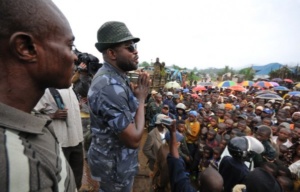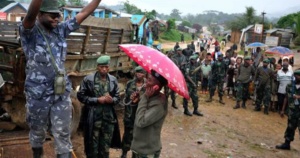The Democratic Republic of Congo’s seemingly unending internecine wars has thrown up as much military warlords as may be imagined if the experiences of Liberia and Sierra Leone are anything to go by. The replication of inhumanity in these contexts is better not imagined.

A most notorious warlord, Ntabo Ntaberi Sheka, who has been declared, wanted for alleged crimes against humanity, surrendered to U.N. peacekeepers on Wednesday, the U.N. mission in Congo (MONUSCO) has said.
The UN’s peacekeeping mission in DR Congo MONUSCO said in a statement that Sheka handed himself in “in full awareness of the fact that he is wanted by the government… to stand trial for alleged crimes”.
Sheka’s militia, Mai-Mai Sheka, which is one of a patchwork of armed groups in eastern Congo, claiming to defend themselves in guerrilla warfare, has been regularly accused by the United Nations and human rights groups of using rape as a weapon of war and implicated in numerous atrocities in eastern Democratic Republic of Congo.

In January 2011, Congolese authorities issued an arrest warrant for Sheka for crimes against humanity of mass rape. However, he remained at large for more than six years as his armed group, known as the Nduma Defense of Congo, continued to commit grave crimes.
While his reasons are not yet established, Sheka surrendered himself to the U.N. peacekeeping mission forces in the town of Mutongo in Walikale territory and was transferred to the eastern city of Goma, said MONUSCO spokeswoman Fabienne Pompey.
“He will be handed over to DRC authorities after the regular procedure and checking is done by MONUSCO,” Pompey told Reuters.
In 2015, Human Rights Watch said Sheka’s forces had killed at least 70 civilians since the arrest warrant was issued, many of whom were hacked to death by machete and whose body parts were paraded around town as the fighters chanted slurs against rival ethnic groups.
According to the United Nations, Sheka’s forces and two other armed groups raped and killed at least 387 civilians, made up of women, men, girls, and boys in 13 villages along the Kibua to Mpofi road in eastern Congo’s Walikale territory between July 30 and August 2, 2010 to punish them for allegedly collaborating with Congolese government forces.
Despite the 2003 end to years of war in eastern Congo that killed millions, mostly from hunger and disease, dozens of armed groups continue to operate there, exploiting vast mineral reserves which have been widely recognised as a chief cause for the unending military adventures and preying on the local population.
His soldiers are accused of razing almost 1,000 homes and businesses and leading about 100 people off into forced labour.
The Congolese authorities issued a warrant for Sheka’s arrest in January 2011 but despite joint operations by the Congolese army and U.N. forces against his group, he remained at large in Walikale’s remote forests.
Since the time the warrant was issued, further crimes perpetrated by Sheka have been documented by the Human Rights Watch.
Sheka’s forces killed at least 70 civilians, many of whom were hacked to death by machete. In some cases, Sheka’s fighters mutilated the bodies of those killed and later paraded the body parts around town, while chanting ethnic slurs. His forces have also continued to rape women and girls and forcibly recruited scores of young men and boys into their ranks.
His Mai Mai fighters abducted dozens of women and girls, many of whom are still being held hostage as sex slaves, HRW said.
Congolese judicial officials, with the support of UN peacekeepers, attempted to arrest Sheka as early as July 2011, but he escaped, allegedly tipped off by authorities. Four months later, Sheka openly ran for public office in eastern Congo and police made no efforts to arrest him as he held public campaign rallies. Since then, government and UN officials met with Sheka on three occasions, encouraging him to surrender but making no efforts to arrest him. Human Rights Watch found that some Congolese army officers, Rwandan officials and other armed groups, including the M23, provided financial and logistical support to Sheka’s armed group.
Due to the rape accusations and other acts that could constitute crimes against humanity, Sheka had been subject to UN sanctions including the freezing of his assets and a worldwide travel ban.
“Thousands of civilians in eastern Congo have been harmed by crimes committed by troops under Sheka’s command, and many still fear future attacks,” Human Rights Watch (HRW) central Africa director Ida Sawyer said in a statement.
There is a serious risk that some of Sheka’s former collaborators will want to silence him. Sheka’s chief of staff died under mysterious circumstances in prison following his arrest in 2011. Altogether, four armed group commanders and four army deserters have been sought on arrest warrants for their alleged involvement in the Walikale mass rape.
His surrender brings hope for justice and a possible reprieve from the violence. Congolese authorities, with support from the UN, should ensure Sheka’s safety in detention and promptly bring him to justice in a fair trial before an independent, impartial and credible court. Authorities should also strengthen their efforts to arrest Sheka’s former military commander, Guidon Shimiray Mwissa, whose troops continue to wreak havoc on civilians in eastern Congo.
Kindly follow us on twitter:@AfricanVoice2









